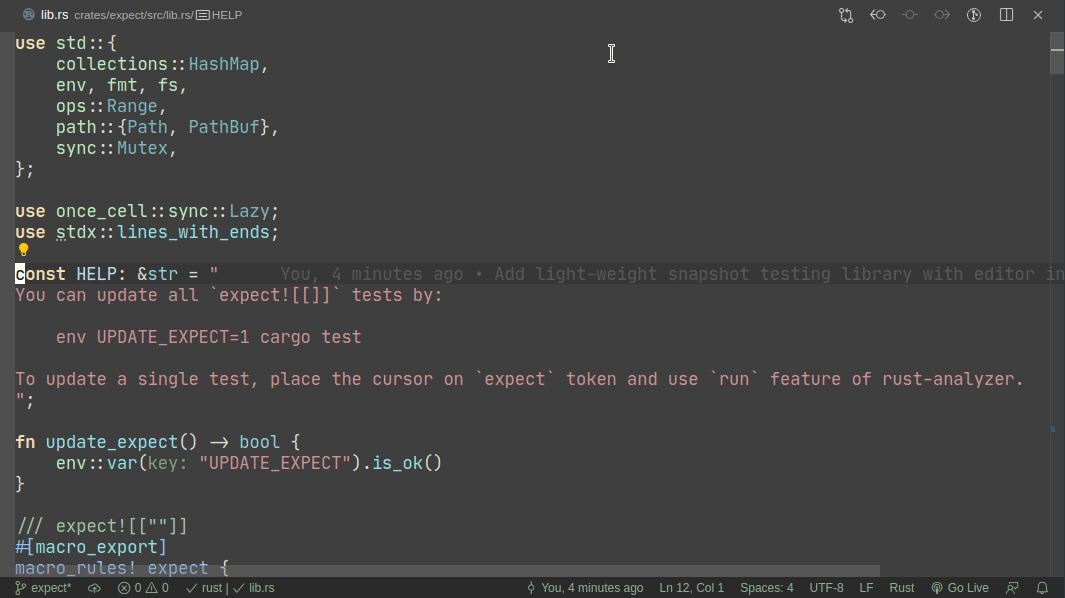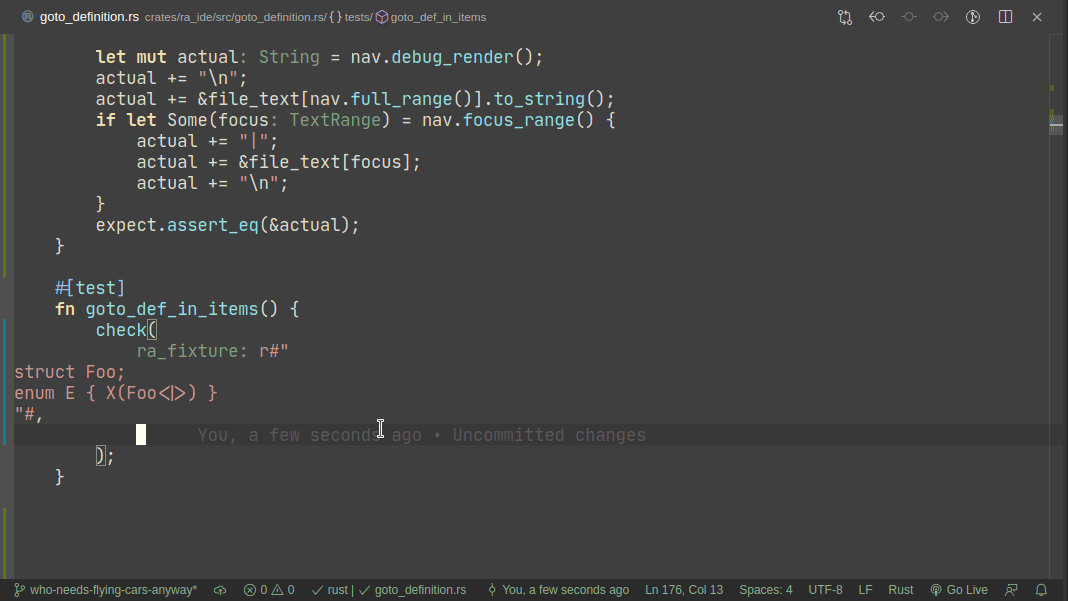5480: Fix snippetTextEdits applying to other files r=matklad a=TimoFreiberg
Fixes#4551
`vscode.window.visibleTextEditors` only contains editors whose contents are being displayed at the moment, so the previous logic only worked if the other file for which a snippetTextEdit is being received was visible in a separate split.
I feel that this is a hacky approach, so feel free to reject it for something nicer :)
Co-authored-by: Timo Freiberg <timo.freiberg@gmail.com>
vscode.window.visibleTextEditors only contains editors whose contents
are being displayed at the moment, so the previous logic only worked if
the other file for which a snippetTextEdit is being received was visible
in a separate split.
Co-authored-by: bjorn3 <bjorn3@users.noreply.github.com>
Override miniz_oxide to build it with optimizations
Building this crate with optimizations decreases the gzipping
part of `cargo xtask dist` from `30-40s` down to `3s`,
the overhead for `rustc` to apply optimizations is miserable on this background
5202: Runnable env r=matklad a=vsrs
This PR adds on option to specify (in the settings.json) environment variables passed to the runnable.
The simplest way for all runnables in a bunch:
```jsonc
"rust-analyzer.runnableEnv": {
"RUN_SLOW_TESTS": "1"
}
```
Or it is possible to specify vars more granularly:
```jsonc
"rust-analyzer.runnableEnv": [
{
// "mask": null, // null mask means that this rule will be applied for all runnables
env: {
"APP_ID": "1",
"APP_DATA": "asdf"
}
},
{
"mask": "test_name",
"env": {
"APP_ID": "2", // overwrites only APP_ID
}
}
]
```
You can use any valid RegExp as a mask. Also note that a full runnable name is something like *run bin_or_example_name*, *test some::mod::test_name* or *test-mod some::mod*, so it is possible to distinguish binaries, single tests, and test modules with this masks: `"^run"`, `"^test "` (the trailing space matters!), and `"^test-mod"` respectively.
Fixes#4450
I suppose this info should be somewhere in the docs, but unsure where is the best place.
Co-authored-by: vsrs <vit@conrlab.com>
5089: Disable auto-complete on comments r=matklad a=BGluth
Resolves#4907 by disabling any auto-completion on comments.
As flodiebold [pointed out](https://github.com/rust-analyzer/rust-analyzer/issues/4907#issuecomment-648439979), in the future we may want to support some form of auto-completion within doc comments, but for now it was suggested to just disable auto-completion on them entirely.
The implementation involves adding a new field `is_comment` to `CompletionContext` and checking if the immediate token we auto-completed on is a comment. I couldn't see a case where we need to check any of the ancestors, but let me know if this is not sufficient. I also wasn't sure if it was necessary to add a new field to this struct, but I decided it's probably the best option if we want to potentially do auto-completion on doc comments in the future.
Finally, the three tests I added should I think ideally not filter results by `CompletionKind::Keyword`, but if I want to get unfiltered results, I need access to a non-public function [get_all_completion_items](9a4d02faf9/crates/ra_ide/src/completion/test_utils.rs (L32-L39)) which I don't know if I should make public just for this.
5161: SSR: Add initial support for placeholder constraints r=matklad a=davidlattimore
5184: Always install required nightly extension if current one is not nightly r=matklad a=Veetaha
This is weird, but having switched back to stable by uninstalling the extension appears that vscode doesn't destroy the `PersistentState` and thus changing to `nightly` channel doesn't work because the last check for nightly extension was less than 1 hour ago. The simple solution is to skip this check if we know that the current extension version is not nightly.
5185: Force showing extension activation error pop-up notification r=matklad a=Veetaha
Fixes https://github.com/rust-analyzer/rust-analyzer/issues/5091
5186: fix: correct pd/ppd/tfn/tmod completion doc r=matklad a=fannheyward
a33eefa3b2/crates/ra_ide/src/completion/complete_snippet.rs (L23-L24)
Co-authored-by: BGluth <gluthb@gmail.com>
Co-authored-by: David Lattimore <dml@google.com>
Co-authored-by: Veetaha <veetaha2@gmail.com>
Co-authored-by: Heyward Fann <fannheyward@gmail.com>
5101: Add expect -- a light-weight alternative to insta r=matklad a=matklad
This PR implements a small snapshot-testing library. Snapshot updating is done by setting an env var, or by using editor feature (which runs a test with env-var set).
Here's workflow for updating a failing test:

Here's workflow for adding a new test:

Note that colorized diffs are not implemented in this PR, but should be easy to add (we already use them in test_utils).
Main differences from insta (which is essential for rust-analyzer development, thanks @mitsuhiko!):
* self-updating tests, no need for a separate tool
* fewer features (only inline snapshots, no redactions)
* fewer deps (no yaml, no persistence)
* tighter integration with editor
* first-class snapshot object, which can be used to write test functions (as opposed to testing macros)
* trivial to tweak for rust-analyzer needs, by virtue of being a workspace member.
I think eventually we should converge to a single snapshot testing library, but I am not sure that `expect` is exactly right, so I suggest rolling with both insta and expect for some time (if folks agree that expect might be better in the first place!).
# Editor Integration Implementation
The thing I am most excited about is the ability to update a specific snapshot from the editor. I want this to be available to other snapshot-testing libraries (cc @mitsuhiko, @aaronabramov), so I want to document how this works.
The ideal UI here would be a code action (💡). Unfortunately, it seems like it is impossible to implement without some kind of persistence (if you save test failures into some kind of a database, like insta does, than you can read the database from the editor plugin). Note that it is possible to highlight error by outputing error message in rustc's format. Unfortunately, one can't use the same trick to implement a quick fix.
For this reason, expect makes use of another rust-analyzer feature -- ability to run a single test at the cursor position. This does need some expect-specific code in rust-analyzer unfortunately. Specifically, if rust-analyzer notices that the cursor is on `expect!` macro, it adds a special flag to runnable's JSON. However, given #5017 it is possible to approximate this well-enough without rust-analyzer integration. Specifically, an extension can register a special runner which checks (using regexes) if rust-anlyzer runnable covers text with specific macro invocation and do special magic in that case.
closes#3835
Co-authored-by: Aleksey Kladov <aleksey.kladov@gmail.com>
5119: Show notification while SSR is in progress r=matklad a=davidlattimore
Ideally we would (a) show progress and (b) allow cancellation, but at least now there's some indication to the user that something is happening.
Co-authored-by: David Lattimore <dml@google.com>
5025: Don't mess with messy temp dir and just download into extension dir r=matklad a=Veetaha
Temp dirs are messy. Dealing with them requires handling quite a bunch of
edge cases. As proposed by lnicola this seems better to just put the temp files
in the extension dir and not care much about suddenly leaving garbage.
Instead we get shorter and less platform-caveat-y code.
We will also assume users don't try to issue a download in different vscode windows simultaneously.
Fixes#5019
Co-authored-by: Veetaha <veetaha2@gmail.com>